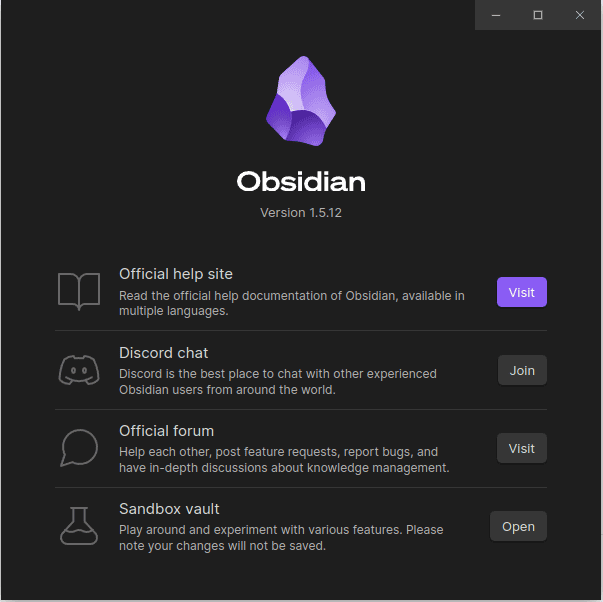So, I have tried many different note-taking apps. Some worked great, and others needed improvements. Over the years, I have narrowed the criteria to being able to use it on multiple devices (phone, laptop, desktop), being able to use it offline, having privacy, and having many features. At first, I liked every note, but then I changed it up and started looking at Onenote. Eventually, I decided that Microsoft knew enough about me and moved to Joplin (self-hosted). Having used Joplin for about 2 years, I moved to Google Keep and once again wanted to limit the data Google Knows about me, so I moved to Standard Notes. I have been using Obsidian for about a year, and I don’t think I will be switching anytime soon. I love the interface and the ability to use the markdown language, but most of all, I love the plugins!

Obsidian can be hosted locally or in the cloud. It also has MANY plugins that can help expand its feature set. I even considered using it to create my website but decided against it because most websites I currently have to maintain are WordPress. Below is a list of Obsidian plugins that I use!
Core Plugins (Maintained by Obsidian)
Backlinks
The Backlinks plugin allows you to easily view and manage all incoming links to a specific note, helping you see how your thoughts are interconnected. It automatically updates as new links are added to other notes, enhancing the navigability of your digital knowledge base. It is great for visual people!
Bookmarks
With the Bookmarks plugin, you can quickly mark important sections or documents for easy access later, organizing your notes more efficiently. This tool is handy for large databases where specific information needs to be readily retrievable.
Daily Notes
The Daily Notes plugin helps you create and organize a new note for each day with just one click, encouraging consistent note-taking habits. It’s ideal for users who integrate journaling or daily planning into their routine. I have not been much of a journaler in the past, but I am slowly working on this. Some days, I write just a few words; others seem like a few pages.
File Recovery
File Recovery provides an essential safety net by automatically saving versions of your notes, allowing you to restore them in case of accidental deletions or unwanted edits. This plugin ensures your data is secure and recoverable, giving you peace of mind.
Files
The Files plugin enhances file management within Obsidian by offering powerful tools for organizing, searching, and navigating your files. It supports various file types, making it versatile for different types of content storage.
Community Plugins
Advanced Tables
Advanced Tables significantly improve the functionality of markdown tables in Obsidian, providing features like column sorting and cell formatting. It’s a must-have for users who work extensively with data within their notes.
Better Wordcount
Better Wordcount offers detailed statistics about your document, including word count, character count, and reading time, which are essential for writers maintaining productivity and meeting goals. This plugin adds a layer of analytics to your writing process.
Copilot
The Copilot plugin utilizes AI to offer suggestions and help with writing, coding, and more within Obsidian. It acts as a virtual assistant, boosting your efficiency by automating routine tasks and offering intelligent recommendations.
Homepage
The homepage allows you to set a custom start page for Obsidian, so you can access your most essential notes or projects immediately upon opening the app. This plugin enhances your workflow by streamlining access to critical documents.
Here is a list of the previous apps I have tried.
Evernote
Evernote is a versatile app for note-taking, organizing, and archiving. It’s known for its ability to sync across all devices, making it easy to access your notes anywhere and anytime. I was not fond of the app’s aesthetics and pricing.
OneNote
OneNote, part of the Microsoft Office suite, offers a flexible digital notebook approach to gathering and organizing notes and information. Its strong integration with other Microsoft products makes it ideal for those within the Office ecosystem. I have used this at work, and many customers use it every day. I wouldn’t say I like Microsoft having everything, but it is a good app and a solid choice.
Google Keep
Google Keep is a straightforward and efficient note-taking app that integrates seamlessly with Google’s other services. It allows for simple note-taking, including lists and voice memos, and is accessible across all devices.
Joplin
Joplin is an open-source application designed for note-taking and to-do management. It supports end-to-end encryption to secure data. It allows for extensive customization and data control, appealing to users with strong privacy concerns. You can self-host it or use a service such as Pikapods to host it for you. I liked the app but wanted more features.
Standard Notes
Standard Notes focuses on simplicity and privacy, offering end-to-end encryption to keep your notes completely private. It’s designed for those who need a secure and minimalistic digital note-taking service. The pricing was reasonable, but I again wanted something with a more extensive feature set. I still follow the app, and it has added features since I last used it. Standard Notes is a great app, and it’s nothing to sneeze at.
SimplyNote
SimplyNote is a streamlined note-taking app emphasizing ease of use and basic functionality. It’s ideal for users who prefer a no-frills, straightforward approach to capturing thoughts and to-do lists. It was okay but really lacked features.
